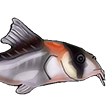breeding and raising sturisoma magdalense
- paul dixon
- Posts: 17
- Joined: 18 Oct 2003, 12:13
- My cats species list: 4 (i:0, k:0)
- Location 1: LIVERPOOL UK
- Location 2: LIVERPOOL ENGLAND
- Interests: all things living
breeding and raising sturisoma magdalense
has anybody any experience in this field? I have 8 adults which have recently spawned with about 200 fry coming through.
Have spawned S. Panamense in the past with some success and hope these will be as co-operative.
They are supposed tobe a new fish from Peru although I have been unable to locate any information on them.
Have spawned S. Panamense in the past with some success and hope these will be as co-operative.
They are supposed tobe a new fish from Peru although I have been unable to locate any information on them.
- Shane
- Expert
- Posts: 4625
- Joined: 30 Dec 2002, 22:12
- My articles: 69
- My images: 162
- My catfish: 75
- My cats species list: 4 (i:75, k:0)
- My aquaria list: 5 (i:5)
- Spotted: 99
- Location 1: Tysons
- Location 2: Virginia
- Contact:
There is no Sturisoma magdalenae, meaning it is not a valid scientific name. There is a Rineloricaria magdalenae and two Sturisoma type fish from the river: Sturisoma aureum and Sturisomatichthys leightoni. S. aureum is exported in fair numbers, however, it does not make sense why the fish would have the trade name "magdalenae" attached if they come from Peru since the Rio Magdalena is in Colombia.
-Shane
-Shane
"My journey is at an end and the tale is told. The reader who has followed so faithfully and so far, they have the right to ask, what do I bring back? It can be summed up in three words. Concentrate upon Uganda."
Winston Churchill, My African Journey
Winston Churchill, My African Journey
- paul dixon
- Posts: 17
- Joined: 18 Oct 2003, 12:13
- My cats species list: 4 (i:0, k:0)
- Location 1: LIVERPOOL UK
- Location 2: LIVERPOOL ENGLAND
- Interests: all things living
sturisoma magdalense
thanks for the prompt response, however I have looked again at my wholesaler list
and the fish are still listed under the above name. My list however is from Columbia and not from Peru as I originally stated.
They have an appearance of Panamense but are nowhere near as large, being only 6 inches SL.
Paul
and the fish are still listed under the above name. My list however is from Columbia and not from Peru as I originally stated.
They have an appearance of Panamense but are nowhere near as large, being only 6 inches SL.
Paul
- Shane
- Expert
- Posts: 4625
- Joined: 30 Dec 2002, 22:12
- My articles: 69
- My images: 162
- My catfish: 75
- My cats species list: 4 (i:75, k:0)
- My aquaria list: 5 (i:5)
- Spotted: 99
- Location 1: Tysons
- Location 2: Virginia
- Contact:
Paul,
Sounds like Sturisoma aureum. I just submitted a Fact Sheet on these guys for the Cat-eLog and imagine Jools will have it up as soon as he is able. One key to distinguishing S. aureum from S. panamense is size. S. aureum never gets much larger than six inches. S. panamense comes from the lower stretches of the Magdalena and likes warm temps. In fact, the last batch of S. panamense that came through Bogota were collected near Santa Marta on the north coast of Colombia. S. aureum starts fading fast at temps above 78 and is very happy in the low 70s to upper 60s. I have found it to be a touchy fish. Buy six and you end up with one or two. That said, you should have better luck since your fish went through a trans shipper who probably treated them for any obvious diseases. This is S. aureum...

Sturisomatichthys leightoni are also often mixed with these shipments.

-Shane
Sounds like Sturisoma aureum. I just submitted a Fact Sheet on these guys for the Cat-eLog and imagine Jools will have it up as soon as he is able. One key to distinguishing S. aureum from S. panamense is size. S. aureum never gets much larger than six inches. S. panamense comes from the lower stretches of the Magdalena and likes warm temps. In fact, the last batch of S. panamense that came through Bogota were collected near Santa Marta on the north coast of Colombia. S. aureum starts fading fast at temps above 78 and is very happy in the low 70s to upper 60s. I have found it to be a touchy fish. Buy six and you end up with one or two. That said, you should have better luck since your fish went through a trans shipper who probably treated them for any obvious diseases. This is S. aureum...

Sturisomatichthys leightoni are also often mixed with these shipments.

-Shane
"My journey is at an end and the tale is told. The reader who has followed so faithfully and so far, they have the right to ask, what do I bring back? It can be summed up in three words. Concentrate upon Uganda."
Winston Churchill, My African Journey
Winston Churchill, My African Journey
- Kostas
- Posts: 791
- Joined: 23 Apr 2003, 10:57
- I've donated: $256.00!
- My images: 19
- My cats species list: 14 (i:0, k:0)
- My aquaria list: 1 (i:1)
- Spotted: 6
- Location 1: Greece,Athens
- Location 2: Greece,Athens
- Interests: Fishkeeping,diving,skiing,r/c modeling,growing Palm trees,ferns and tropical plants
- Contact:




